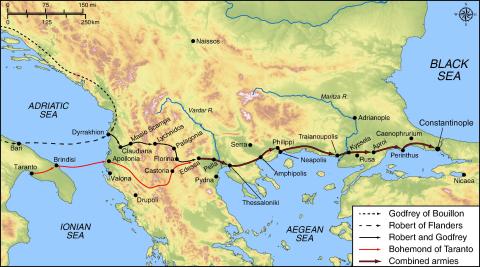Bohemond's March to Constantinople
[1.4.3] Hī omnēs trānsfretāvērunt ad Boamūndī famulātum, et applicuērunt Bulgāriae partibus; ubi invēnērunt nimiam abundantiam frūmentī et vīnī et alimentōrum corporis. Deinde, dēscendentēs in vallem dē Andronopoli, expectāvērunt gentem suam, dōnec omnēs pariter trānsfretāssent. Tunc Boamundus ōrdināvit concilium cum gente suā, confortāns, et monēns omnēs ut bonī et humilēs essent; et nē dēpraedārentur terram istam, quia Chrīstiānōrum erat, et nēmō acciperet nisi quod eī sufficeret ad edendum.
[1.4.4] Tunc exeuntēs inde, vēnērunt per nimiam plēnitūdinem dē vīllā in vīllam, dē cīvitāte in cīvitātem, dē castellō in castellum, quousque pervēnimus Castōriam; ibique Nātīvitātem Dominī sōlemniter celebrāvimus; fuimusque ibi per plūrēs diēs, et quaesīvimus mercātum, sed ipsī nōluērunt nōbīs assentīre, eō quod valdē timēbant nōs, nōn putantēs nōs esse peregrīnōs, sed velle populārī terram et occīdere illōs. Quāpropter apprehendēbāmus bovēs, equōs et asinōs, et omnia quae inveniēbāmus. Ēgressī dē Castōriā, intrāvimus Palagōniam, in quā erat quoddam hereticōrum castrum. Quod undique aggressī sumus, moxque nostrō succubuit imperiō. Accēnsō itaque igne, combussimus castrum cum habitātōribus suīs.
notes
vocabulary
1.4.3
famulātus –ūs, m.: servitude (CL); allegiance (ML)
nimius –a –um: very great (OLD 4)
confortō (1): to strengthen; to encourage, support (LL)
1.4.4
villa –ae, f.: farm (CL); village (ML)
quousque: how far (CL); until (ML)
plūres plūra: plures: very many (OLD 5)
assentiō assentīrī assensus: to agree
eō quod: for the reason that, because
putō (1): to think, suppose
peregrīnus –ī, m.: foreigner (CL); traveler, pilgrim; crusader (ML)
populor (1): to ravage, plunder
castrum –ī, n.: fort, stronghold, fortified village (ML)
undique: from all sides, everywhere (CL) completely (ML)
succumbō (3): to give in to (OLD 3)

